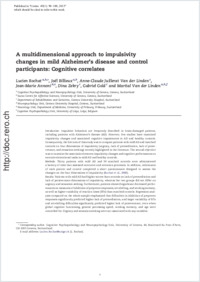A multidimensional approach to impulsivity changes in mild Alzheimer’s disease and control participants: cognitive correlates
- Rochat, Lucien Cognitive Psychopathology and Neuropsychology Unit, University of Geneva, Switzerland - Swiss Centre for Affective Sciences, University of Geneva, Switzerland
- Billieux, Joël Cognitive Psychopathology and Neuropsychology Unit, University of Geneva, Switzerland - Swiss Centre for Affective Sciences, University of Geneva, Switzerland
- Juillerat Van der Linden, Anne-Claude Department of Rehabilitation and Geriatrics, Geneva University Hospital, Switzerland
- Annoni, Jean-Marie Neuropsychology Unit, Geneva University Hospital, Switzerland - Neurology Unit, Department of Medicine, University of Fribourg, Switzerland
- Zekry, Dina Department of Rehabilitation and Geriatrics, Geneva University Hospital, Switzerland
- Gold, Gabriel Department of Rehabilitation and Geriatrics, Geneva University Hospital, Switzerland
- Linden, Martial Van der Cognitive Psychopathology and Neuropsychology Unit, University of Geneva, Switzerland - Swiss Centre for Affective Sciences, University of Geneva, Switzerland
-
02.12.2011
Published in:
- Cortex. - 2013, vol. 49, no. 1, p. 90–100
English
Introduction: Impulsive behaviors are frequently described in brain-damaged patients, including patients with Alzheimer’s disease (AD). However, few studies have examined impulsivity changes and associated cognitive impairments in AD and healthy controls. Consequently, the first aim of this study was to compare patients with mild AD and matched controls on four dimensions of impulsivity (urgency, lack of premeditation, lack of perseverance, and sensation seeking) recently highlighted in the literature. The second objective was to examine the association between impulsivity changes and cognitive performances on executive/attentional tasks in mild AD and healthy controls.Methods: Thirty patients with mild AD and 30 matched controls were administered a battery of tests that assessed executive and attention processes. In addition, informants of each patient and control completed a short questionnaire designed to assess the changes on the four dimensions of impulsivity (Rochat et al., 2008).Results: Patients with mild AD had higher scores than controls on lack of premeditation and lack of perseverance dimensions of impulsivity, whereas the two groups did not differ on urgency and sensation seeking. Furthermore, patients showed significant decreased performances on measures of inhibition of prepotent responses, set-shifting, and working memory, as well as higher variability of reaction times (RTs) than matched controls. Regression analyses computed on the whole sample emphasized that difficulties in inhibition of prepotent responses significantly predicted higher lack of premeditation, and larger variability of RTs and set-shifting difficulties significantly predicted higher lack of perseverance, even when global cognitive functioning, general processing speed, working memory, and age were controlled for. Urgency and sensation seeking were not associated with any variables.
- Faculty
- Faculté des sciences et de médecine
- Department
- Médecine 3ème année
- Language
-
- English
- Classification
- Biological sciences
- License
- License undefined
- Identifiers
-
- RERO DOC 31890
- DOI 10.1016/j.cortex.2011.08.004
- Persistent URL
- https://folia.unifr.ch/unifr/documents/302935
Statistics
Document views: 64
File downloads:
- ann_mai.pdf: 221
